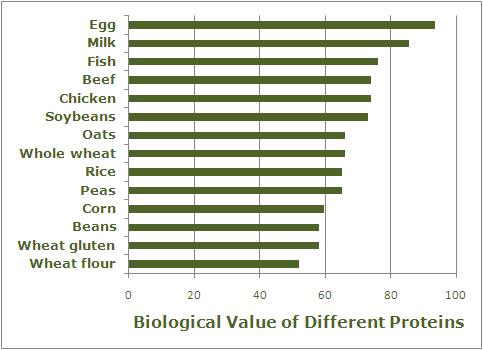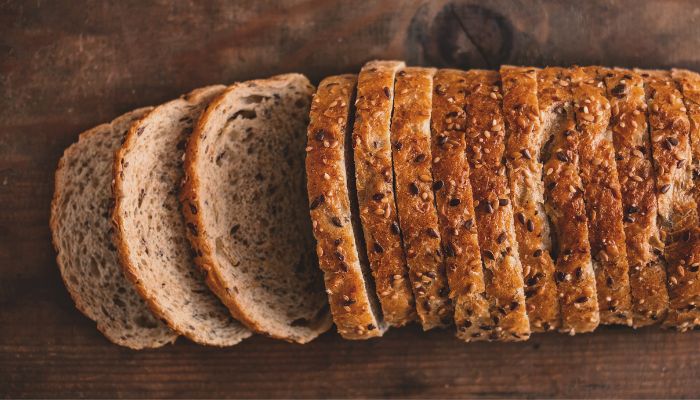The fitness industry has a propensity to divide subjects into polar opposites, leaving a vast space of opportunity between the two.
For example, many fitness enthusiasts see foods as being either ‘clean’ or ‘dirty’; there’s no middle-ground in their minds.
Thus, it’s not a surprise that the subject of protein needs for muscle growth would follow suit.
With all the conflicting information and bro-science touted online, it can be confusing and frustrating to find your optimal protein intake for muscle growth.
With this in mind, let’s take a deeper look at what makes sense from both scientific and anecdotal perspectives in terms of how much protein is optimal for developing muscle mass.
Daily Protein Requirements for Building Muscle

There are many studies out there that have looked at protein dosing for maximizing muscle growth in athletes and bodybuilders. I’ve seen recommendations range from as low as 0.4g to as high as 2g of protein per pound of body weight.
Based on recent research findings and clinical studies, it’s safe to say that 1.2 to 1.5 grams of protein per kilogram of body weight is an adequate intake for healthy adults (though more is recommended for extremely active individuals).
I’ve heard people preach that consuming upwards of 4g of protein per kilogram of body weight is necessary for maximizing muscle growth; let me assure you, that is an exorbitant amount of protein for any drug-free lifter and complete overkill.
For active adults who train with weights and want to pack on muscle mass, a generous starting point for protein consumption is about 2.5 grams per kilogram of body weight, per day.
For those using the empirical system, this converts to about 1.15 grams of protein per pound of body weight.
If you have been inundated with typical bodybuilding dogma, that may not appear to be sufficient protein for building muscle.
You can certainly consume more or less protein than that, though 1.15 grams of protein/lb of bodyweight is a good starting point, and my recommendation is to work with at least 1.2g of protein per pound of bodyweight if you’re serious about building muscle mass.
How to Calculate Optimal Protein Intake
There are a couple of good ways to work out your daily protein requirements.
Method 1:
You’ll need to know what your daily calorie requirements are for this. Go get that number before you go any further, I’ll wait.
Example Calculation
Let’s say that you’re a 160lbs man and you require 2,175 calories per day to build muscle.
If you’ve read my post about macronutrient ratios, you’ll know that around 35% of your diet should come from quality proteins.
In this example, we’ll need to calculate 35% of 2,175 (use Google) – which is 760.
Next, we divide 760 by 4 (because 1g of protein contains 4 calories)
760 ÷ 4 = 190g
There you go – In this example, you’d need 190g of protein per day.
You can then break this up over 4 or 5 meals, like so;
190 divided by 5 = 38g of protein per meal.
You want each meal to contain around 30 – 40g of protein, to ensure you’re getting enough to maximize muscle protein synthesis.
Method 2:
This method for calculating protein is probably a bit easier.
Simply take your body weight – in this example, we’ll stick with the 160lbs male – and multiply it by the recommended 1.2g per pound of body weight.
1.2 x 160 = 192g
As you can see, both methods produce roughly the same number of around 190g. Both work well, and both methods apply to men and women seeking to increase muscle mass in combination with a good weight training program.
Protein Digestion Rate and Source Quality
A common concern among gym-goers is the digestive rate/absorption speed of protein sources.
Well, let’s dispel some myths and usher the facts on this topic.
How Protein is Absorbed
The digestive process for all food starts in the mouth which is mainly responsible for physically breaking down what you eat.
After your teeth do their dirty business, morsels of food head to your stomach where the next step of food digestion occurs.
The stomach contains gastric acid which acts to denature (break down) proteins and activates essential digestion enzymes (such as pepsin and chymotrypsin) that cleaves proteins into smaller polypeptides.
These polypeptides now head to your duodenum, which is a part of the intestinal tract. This particular part of your gut is filled with digestive enzymes that further break down polypeptides into di-/ tri-peptides and isolated amino acids; most of protein food digestion happens here.
These separated amino acids and small peptides can now either enter your intestinal cells or pass through your liver.
Upon arrival to your liver, amino acids may be sent to numerous metabolic paths in accordance with your body’s energetic demands (e.g. used for protein synthesis, utilized as a substrate for gluconeogenesis, and so on).
Does All Digested Protein Go Towards Muscle Protein Synthesis?
Now that we have a much better understanding of protein digestion, it is necessary to note that not all those isolated amino acids and shorter peptides will go towards creating new muscle tissue/muscle protein synthesis (MPS).
To put it simply, eating 100 grams of protein in a meal will not lead to a larger rise in MPS than a more modest amount. Based on research findings, 30 – 40 grams of a leucine-rich protein source (e.g most animal and milk proteins) are sufficient for maxing out the MPS response to a meal for at least 3-5 hours – with a few exceptions that will be noted in just a bit.
This isn’t to say that you must restrict protein consumption to 30 grams per meal for optimum muscle growth.
Bigger people will clearly need more and vice versa.
Furthermore, the protein that doesn’t go towards protein synthesis is still biologically useful for other roles in your body.
Nevertheless, consuming an exorbitant amount of protein in a given meal (like 200+ grams) will likely lead to a large percentage of those amino acids being oxidized and sent to the liver for gluconeogenesis, and/or excretion.
Protein Sources and Digestion Rates

If we break down what constitutes a protein source as being “best” or “high quality”, we are searching for a protein that maximizes MPS in a given meal and a protein that is well absorbed/digested.
Good Quality Sources of Protein
- Red Meat: lean Steak, ground beef, top round, and sirloin
- Poultry: Ground turkey, chicken breast, turkey breast, Free range eggs
- Fish: Tuna (canned), salmon, white fish
- Dairy: Cottage cheese, milk, whey protein isolate, low fat yogurt
- Nuts: Almonds, cashews, walnuts, pistachios
The higher the biological value of a protein, the more is absorbed and put to building new muscle tissue, and from the chart below you can see which proteins are more “powerful” in terms of their BV.

MPS is differentially stimulated in proportion to the essential amino acid profile of the food – particularly the L-leucine – the amino acid found to be the main driver behind stimulation of muscle protein synthesis, which leads to muscular adaptations.
Hence, mixing numerous incomplete protein sources in a meal can still elicit an optimal MPS response so long as you consume all the necessary EAAs.
Furthermore, research has demonstrated that blending protein sources might be more efficient than subsisting on one source consistently for your protein needs.
For instance, the abundant leucine content of whey protein paired with the delayed-release nature of casein protein can provide a continual elevation of protein synthesis for many hours after consumption, which would not happen if you consume solely whey protein.
For that reason, it’s not prudent to identify a single protein source as being the absolute best when myriad sources of protein are beneficial for muscle growth.
In fact, a vegetarian can construct just as much muscle as a carnivore so long as adequate EAAs (and total grams of protein) are being taken in. Nonetheless, whey protein is certainly a premium source of EAAs (particularly L-leucine).
Getting the Most From Your Protein Consumption
As mentioned earlier, these suggestions serve as starting point for active gym-goers who want to build muscle. Different factors like body mass, sex, age, genetics, and anabolic steroid use will modify your exact protein needs.
Do not hesitate to do some experimenting to discover your body’s optimal protein intake.
As rules of thumb though, remember these tips:
- Take in approximately 1.15 to 1.4 grams of protein per pound of your body weight.
- Preferably, take in a minimum of 30 grams or more of quality protein with each meal.
- For building muscle mass, consume at least four to five protein-rich meals per day, spaced roughly three to four hours apart.
Common Myths Surrounding Protein intake for Muscle Mass
How much protein we should consume to gain muscle has been discussed and debated over for decades.
Over the years, a number of myths associated with this subject have developed.
This same question is brought up most often by people who are new to bodybuilding – even some experienced bodybuilders argue over the question of how much protein to eat.
I’ve showed you the numbers to crunch, this question is now put to rest.
By getting enough protein each day, you will be able to gain and maintain muscle in conjunction with proper weight training and rest.
Myth 1: High Protein Diets will Damage your Kidneys
The fact is, there’s not a single solid study that shows high protein consumption causes any kind of kidney damage or dysfunction in healthy people. This myth started because some people with preexisting kidney problems experienced stress on their kidney when processing protein in their diet.
The ‘International Journal of Sport Nutrition’ published a study that examined the kidney function of athletes and bodybuilders that followed a high protein diet. Analysis of their blood and urine on a protein-rich diet found that their kidney function remained within the normal range.
Myth 2: You can only Digest 30 grams of Protein per Meal
There has been a long-standing myth that we are only able to digest and use 30 grams of protein per meal. I’ve heard people throw all different numbers around from 20 to 50 grams, but the most popular number at the moment seems to be 30 grams.
It doesn’t matter if you eat 20, 30 or 80 grams of protein per meal, your body will digest and absorb it ALL. Now, will your body use all 80 grams of protein in one sitting to build muscle?
No, probably not, but it will absorb it all and use what it needs to repair damaged muscle tissue.
Protein plays many roles in the human body beyond muscle growth. Proteins are the building blocks of the body, muscles, skin, and hair are all made of protein.
How much protein goes to building muscle depends on how much the body needs to recover and grow from an intense weight training session.
As long as you’re getting enough protein into your body to recover and meet your protein synthesis needs in response to working out then you will grow.
Any extra protein consumed will go to other functions in the body, used as energy or excreted.
Myth 3: Too Much Protein will Make you Fat
Protein is a macronutrient responsible for a vast array of functions in the body, from replicating DNA to transporting molecules. Protein itself will not make you fat, eating excess calories will.
Increasing how much protein you are taking into your body will not make you gain body fat, because the pathways that allow protein to turn into fatty acids are so small that they won’t cause fat deposition.
However, protein contains calories, around 4 calories per gram. That’s quite low compared to fat which contains 9 calories per gram. Now, when you eat protein it releases a hormone called glucagon which causes a fat burning effect. Furthermore, glucagon helps stabilize blood sugar levels.
Protein also has a thermogenic effect which aids in calorie burning.
Dept. of Nutrition, Harvard School of Public Health
There is convincing evidence that a higher protein intake increases thermogenesis and satiety compared to diets of lower protein content. The weight of evidence also suggests that high protein meals lead to a reduced subsequent energy intake. Some evidence suggests that diets higher in protein result in an increased weight loss and fat loss as compared to diets lower in protein. Ref.
Increasing protein intake is a great way to stimulate the fat-burning process.
Calorie for calorie, it requires more energy to burn than fat or carbohydrates.
According to a study found in the Journal of Obesity, high protein diets can have a positive effect on metabolism. It also helps you feel satiated (fuller) longer.
The fuller you are, the less inclination there is to overeat.
Remember, macronutrients like protein, carbs, and fat will only cause increased body fat if their energy content is (in the form of calories) consumed in a quantity higher than your body burns.
In Summary
The United States RDA has said that you should eat around 80 grams of protein per 200 pounds of body weight as your daily intake.
The ‘Food and Nutrition Board, Institute of Medicine’ recommend 56 grams of protein per day for men aged between 19 and 70 years.
These figures aren’t much use to us looking to build muscle though, because this study is based on the average person who is sedentary.
If you train hard and lift weights with the goal of building muscle, the rule of thumb that has proven effective is that you should get at least 1.15 grams (1.2g being most ideal) of quality protein per pound of bodyweight daily.
So, if you weigh 180 pounds, you would need to consume around 200 grams of protein throughout the day to build muscle. By constantly maintaining a high protein diet and eating a 30 – 40g protein source at every meal, hitting your target daily protein intake should be easy.


